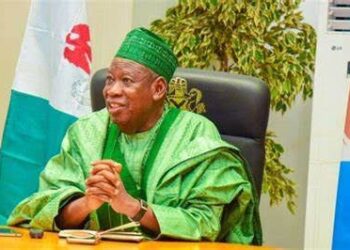Today is informed by yesterday just as tomorrow will be informed by today. Therefore, we should know where we are now and where we want to be tomorrow. Consequently, we have two choices to make as doctored and orchestrated by Frantz Fanon: ‘We must discover our mission and fulfill it or betray it’.
We have had a paradigm shift from military despotism to political liberalism. Having been indicted of political ‘ fraud’, the Khaki boys were served a quit notice, they vamoosed and vacated the political scene for the ‘ rightful owners’ of government and politics. When the agbada and babariga people stormed the political scene, a new age was born. Hopes and dreams were high, fears and pessimism were low. Finally, the age of democracy instantly permeated our public life and formed our new national character.
It’s a civilian project for a new Nigeria. But many who are to execute it and become new are lacking fresh and functional ideas. Most politicians want to be rulers not to lead and serve humanity but to aggrandize themselves, family and close associates, get privileges and corner people’s resources. Instead of building humanity, they end up erecting physical structures with the primary aim of siphoning our hard-earned money. Some of our current leaders are supposed to be led and not the opposite. Could this be the degeneration of our generation?
A chapter in the book of history has it that the late governor of Lagos State, Alhaji Lateef Kayode Jakande, was a vibrant ambassador of the age of good leadership. It was reported that during his reign, he utilized his personal car and residence instead of using official vehicle and house. The media named him ‘ the action governor’ for his outstanding achievements. The late governor Abubakar Rimi of Kano state obtained a bank loan to build his only house. He emerged as ‘the apostle of change’ for his insatiable desire for a masses’ oriented government. But this age has its own tragedy. At the end of the tenure of most of our governors from 1999 to date, they are charged with corrupt practices amounting to trillions of naira.
Understand that this age is characterised by rewarding corrupt people with higher positions. In other words, the more one is corrupt, the more his or her chances of growing bigger in government and politics. But the beneficiaries of this moral decadence know better. Perhaps, they know that the country is not working for morality and legitimacy. Probably, they paraphrase that cheating pays in Nigeria when it doesn’t pay elsewhere and that it’s not the kind of capital offence that goes with capital punishment.
The many troubles of this age include its lingering legacy of ensuring institutional collapse and the rise of powerful individuals. While our institutions are not working for national development, strong people are working relentlessly against national development. This calls for a review of our ailing systems that make this absurdity our way of living.
Also disturbing is the perpetually intellectual depression of our academic domain. Most campus lecturers are shunning the title of ‘rising intellectual stars’ to illuminate our socio political darkness. Are they afraid of being labeled as extremists and accused of teaching what they are not paid to teach? This was exactly what happened to the late Dr. Yusuf Bala Usman ,Professor Ayodele Awojobi and few others. Yet, they deserve our perpetual accolades for their transformation of vast knowledge to fight oppressive systems and their operators.
Students union bodies, especially at the state level, are annexes to their state governments. In other words, they are a branch of the political parties in power and have lost unionism identity. Recall that the National Association of Nigeria Students of those years was politically formidable than most of our existing political parties. At least, It had a national vision which boosted the spirit of its struggle. Remember the anti-SAP riots which were engineered by the students and subsequently engulfed the nation. But this age is very disappointing because we have not heard students bodies organising a peaceful resistance against the economic slavery called fuel pricing.
More stories are disgusting as they are being unfolded. Apart from the excessiveness of the executive arm, the legislative and judicial sectors are not hitting the nail on its head but they annoy us with their pretension of promoting democracy. The judiciary has many scandalous cases to answer but we cannot judge them better than the court of conscience can do. However, one awful case that will remain ever fresh in our memory was the ‘ victory’ of Senator Ahmed Lawan against the innocent Bashir Machina.
For the legislative house, we will remember it as the engine room for our humongous debt. We mandated the occupants to be the custodians of our aspirations but sold them to the past executive by simply adopting a rubber stamp style. They have endangered us and our children for debts that are doing more harm than good. We have lawmakers with the intelligence of spending billions of naira for bullet proof cars, but lack the wisdom to stand for the defenceless masses against the onslaught of fuel pricing.
This is even more pathetic that they also want an upward review of their salaries to tally with the reality of high cost of fuel. The late President Shehu Shagari’s salary was fixed at N40,000,00 but he vehemently kicked against it, telling the world categorically that the amount was huge and unacceptable. He was supported by the late governor Solomon Lar of Plateau State and other politicians of moral conscience. In the end, it was pegged down to N35,000.00. Why are we not having these selfless leaders in this age?
I have not yet recovered from the gigantic shocks of the unprecedented level monetisation of the last elections and the large scale deployment of foodstuffs and other material enticers in the context of ubiquitous penury. That ‘electoral coup’ like a military coup, resulted in the subversion of popular will. It also culminated in poisoning the soul of our democracy. What will be the fate of 2027 elections? How realistic is a new Nigeria? What will alter the porous character of this age?
I was looking for real political parties but ended up with associations of persons with vested interest without national interest. They look very dysfunctional without ideologies to work with. That’s why the governors of a particular party are not executing similar programs. Party supremacy has given way for individuals supremacy. Instead of having ‘possessive’ parties, we are having ‘possessed’ parties. And the age persists with political parties having a body without soul.
Many leaders of this age have scandalized the mandate given them in its democratic perspective. For some, mandate is merely satisfying their political ambitions to be leaders. Others view it as a personal property to aggrandize oneself. However, the pragmatic meaning attached to mandate is the assertion of the President of Brazil, Lula Da Silva. He said, ‘If, at the end of my mandate, all Brazilians have the possibility to eat breakfast, lunch and dinner, I have fulfilled the mission of my life.’ But Nigeria’s version of mandate is not tilted towards Silva’s style. However, our poorly executed mandate has largely lost its political value, like the naira devaluation.
Law is not working in this country that we are living in the description of the late Fidel Castro that ‘in a state of lawlessness, it is illegal to be law abiding’. Certainly there is general lawlessness in Nigeria that some are even happy to break it, and many of the leaders are setting the pace. Charity, they say, begins at home. For instance, our leaders do not show a sense of lawfulness when moving in a convoy. Common law presumes that there must be fulfilling the pledge made by leaders that they would protect people’s lives and properties. Leaders’ convoy reckless driving is an invitation to loss of lives and properties.
When looting erupted in Adamawa state, Castro’s quote came to define our current situation. The ‘ hoodlums’ were engaged in a social reaction resulting from hunger, a product of bad leadership. Hunger is ignorant of the law of illegality. Leaders’ focus in this debacle should be more on the social disease, not the symptoms. We are having hunger as a disease and ‘hoodlums’ as a symptom. Are we fighting diseases or symptoms? Do we continue chasing the shadow leaving the object?
To conclude with Fanon’s philosophy, our mission of this age is becoming unfulfilled. It is an age of too many betrayals. There may be a new Nigeria in this age, but, certainly not for the general populace.
Abdullahi writes from Ringim, Jigawa state via [email protected]




